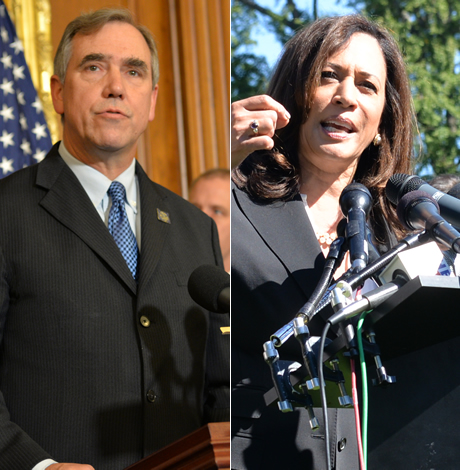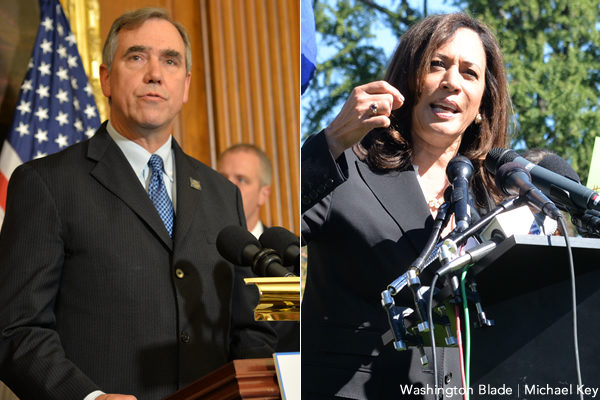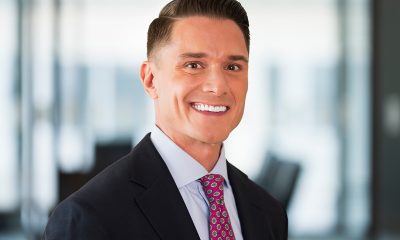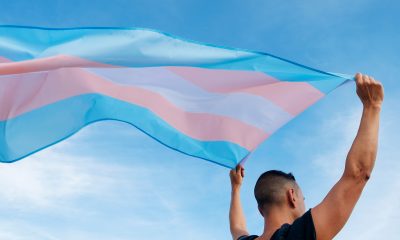News
99 Dems urge State Dept. to recognize citizenship of LGBT couple’s child
Merkley, Harris lead call on Trump administration to drop appeal


A group of 99 congressional Democrats — 80 in the U.S. House, 19 in the U.S. Senate — are calling on the Trump administration to reverse its policy of refusing to recognize the birthright citizenship of children to LGBT families born overseas via surrogacy methods.
The call come in the form of a pair of letters. Leading the letter in the House is Rep. Deb Haaland (D-N.M.) and the co-chairs of the LGBT Equality Caucus, each of an openly LGB member of Congress, including Rep. David Cicilline (D-R.I.), the most senior openly gay member of the U.S. House. In the Senate, Sen. Jeff Merkley (D-Ore.) and Sen. Kamala Harris (D-Calif.) are leading the charge.
Both letters are dated June 6 and addressed to a Secretary of State Mike Pompeo. The House says the Trump administration policy is “discriminatory and cruel”; the Senate calls it “extraordinary and deeply disturbing.”
“Even in the face of the mounting hardship the policy has created for loving families, your department has gone to great lengths to continue to defend a policy in federal court that separates American families before they reach the U.S. border edge,” the Senate letter says.
The Senate letter refers to the case of Andrew and Elad Dvash-Banks, a married same-sex couple — one an American citizen, and one an Israeli national — who had twin sons through a gestational surrogate in Canada.
The State Department, however, required a DNA test to prove the children were related to the couple to provide them U.S. passports. One child, Aiden, was deemed a citizen because he’s the biological son of Andrew, but the other, Ethan, wasn’t because he’s the biological son of Elad.
The Trump administration continues to refuse to recognize the citizenship of Elad despite the U.S. Supreme Court’s decision 2015 decision in favor marriage equality nationwide, which guarantees all the “constellation of benefits” of marriage to same-sex couples.
In a case against the Trump administration filed by Immigration Equality on the basis that the policy violates the Immigration & Nationality. A federal court ruled against the State Department, but the Trump administration has appealed the decision to the U.S. Ninth Circuit Court of Appeals.
According to the Senate letter, the policy against the couple “is not an isolated case” and addition couples have come forward with similar stories.
“Stories after stories have recently been chronicled of same-sex couples being told by your department that their marriages are, by definition, invalid, and that any children they may have abroad risk becoming stateless,” the letter says. “Every new American parent should focus on celebrating the birth of a child, not be consumed with fear that all members of their family may not be welcomed back home to the United States.”
Both letters call on the Trump administration to change the policy. The Senate letter specifically calls on the Trump administration to “immediately drop” the appeal of the Dvash-Banks case and “make it clear that every U.S. married couple is entitled to the same rights under the U.S. Constitution, no matter whom they love.”
A State Department spokesperson declined to comment in response to the senators’ letter.
“We generally do not comment on our communications with Congress,” the spokesperson said. “Due to ongoing litigation, we have no further comment at this time.”
Joining Merkley and Harris in signing the letter was Sens. Edward Markey (D-Mass.), Chris Murphy (D-Conn.), Patrick Leahy (D-Vt.), Bernie Sanders (I-Vt.), Catherine Cortez Masto (D-Nev.), Dianne Feinstein (D-Calif.), Tom Udall (D-N.M.), Jacky Rosen (D-Nev.), Dick Durbin (D-Ill.), Amy Klobuchar (D-Minn.), Tammy Duckworth (D-Ill.), Chris Coons (D-Del.), Cory Booker (D-N.J.), Maggie Hassan (D-N.H.), Ron Wyden (D-Ore.), Bob Casey (D-Pa.), and Tim Kaine (D-Va.).
Virginia
McPike wins special election for Va. House of Delegates
Gay Alexandria City Council member becomes 8th LGBTQ member of legislature

Gay Alexandria City Council member Kirk McPike emerged as the decisive winner in a Feb. 10 special election for a seat in the Virginia House of Delegates representing Alexandria.
McPike, a Democrat, received 81.5 percent of the vote in his race against Republican Mason Butler, according to the local publication ALX Now.
He first won election to the Alexandria Council in 2021. He will be filling the House of Delegates seat being vacated by Del. Elizabeth Bennett-Parker (D-Alexandria), who won in another Feb. 10 special election for the Virginia State Senate seat being vacated by gay Sen. Adam Ebbin (D-Alexandria).
Ebbin is resigning from his Senate this week to take a position with Virginia Gov. Abigail Spanberger’s administration.
Upon taking his 5th District seat in the House of Delegate, McPike will become the eighth out LGBTQ member of the Virginia General Assembly. Among those he will be joining is Sen. Danica Roem (D-Manassas), who became the Virginia Legislature’s first transgender member when she won election to the House of Delegates in 2017 before being elected to the Senate in 2023.
“I look forward to continuing to work to address our housing crisis, the challenge of climate change, and the damaging impacts of the Trump administration on the immigrant families, LGBTQ+ Virginians, and federal employees who call Alexandria home,” McPike said in a statement after winning the Democratic nomination for the seat in a special primary held on Jan. 20.
McPike, a longtime LGBTQ rights advocate, has served for the past 13 years as chief of staff for gay U.S. Rep. Mark Takano (D-Calif.) and has remained in that position during his tenure on the Alexandria Council. He said he will resign from that position before taking office in the House of Delegates.
Congress
Top Democrats re-introduce trans bill of rights
Lawmakers spoke outside US Capitol on Wednesday

U.S. Sen. Ed Markey (D-Mass.) and U.S. Reps. Pramila Jayapal (D-Wash.), and Sara Jacobs (D-Calif.) announced the reintroduction of a “Trans Bill of Rights” on Wednesday.
Despite chilling winds and snow on the ground, transgender activists, LGBTQ rights advocates, and trans-supporting lawmakers gathered outside the U.S. Capitol to announce the reintroduction of the “Transgender Bill of Rights” resolution to protect trans Americans, as the Trump-Vance administration continues to target LGBTQ Americans.
About 30 people gathered outside to hear from legislators and individuals impacted by recent White House policies.
“Today we say loud and clear that trans rights are human rights, and they must be protected every single day of every single year,” Markey told the crowd. “We stand together in solidarity with the trans community and with those who have too often been left behind by a system that refuses to recognize their humanity. We are here to ensure that every trans and gender-diverse person in America can live freely and safely and authentically. That’s what the Trans Bill of Rights is all about.”
Markey is leading the resolution on the Senate side, while Jayapal is pushing it forward in the House.
“With the Trans Bill of Rights, we are laying out a comprehensive vision to provide protections for transgender and nonbinary people — a vision that ensures every single person has a chance to thrive,” Jayapal said. “A vision that says: you are us, you belong, and you are worthy of the same rights as everyone else. This bill supports amending the Civil Rights Act to ensure that trans people have the same rights and protections as all other Americans. It creates a level playing field where trans people no longer have to fight tooth and nail to get the same treatment as their cisgender friends.”
The resolution for House and the Senate reads:
“Recognizing that it is the duty of the federal government to develop and implement a Transgender Bill of Rights to protect and codify the rights of transgender and nonbinary people under the law and ensure their access to medical care, shelter, safety, and economic security.”
Trans Legislation Tracker, an independent research organization that collects data on anti-trans legislation from the hyper-local level to the floor of the U.S. Senate, found that in 2025, 1,022 measures were proposed across the country to restrict the rights of trans Americans — from health care removals to bathroom bans.
Markey directly called out those lawmakers for what he described as discriminatory actions taken against trans Americans who, as he pointed out, are fighting for rights that everyone else is inherently given.
“Trump and MAGA Republicans have used the power of government to spread fear and hate across our country. They have tried to ban lifesaving and medically necessary health care, strip anti-discrimination protections, and turn trans lives into political talking points for their benefit. Well, we have a message for them: we are louder, we are stronger, and we are not going anywhere. We’re in this fight for the long term,” the Massachusetts senator said.
Jacobs, a co-chair of the Transgender Equality Task Force within the Congressional Equality Caucus, also spoke at the event.
“Trans Americans are being targeted just for being who they are — by laws and court decisions that try to erase them from classrooms, from courts and fields, from health care and public life. These attacks aren’t about safety or fairness,” Jacobs said. “They’re about hatred and instilling fear. And we know how quickly fear can warp into suspicion and violence with deadly consequences.”
In addition to lawmakers, trans Americans and supporters spoke.
Olivia Hunt from Advocates for Trans Equality, LaLa Zannell from the American Civil Liberties Union, as well as three additional people who have been actively harmed by the ongoing wave of anti-trans legislation, shared their stories.
Hunt emphasized the staggeringly high number of anti-trans bills being introduced in statehouses across the country — despite trans adults making up less than 1 percent of the population, according to the Williams Institute’s 2025 data.
“Since 2020, thousands of anti-LGBTQIA+ bills have been introduced in statehouses across the country,” Hunt said. “It’s a veritable tidal wave of political bullying disguised as legislation, and most of these bills specifically target transgender and nonbinary people — especially trans youth and their families. This is a moment that demands action.”
Hunt, who is trans, helps trans people in D.C. obtain legal documents that match their gender identity — something the Trump-Vance administration has stopped.
“Trans youth deserve to be protected by their government. They shouldn’t have to be protected from their government,” she said. “It’s long past time that our federal laws reflect and protect the reality and dignity of all people. Trans people have always existed — we are your neighbors, your family members, your community — and we belong.”
Zannell, who spoke proudly about her trans identity, explained why the bill is necessary and how it would protect trans people in all facets of their lives.
“I stand here as an unapologetic Black trans woman who has led this movement for over a decade to get us to moments like this. The reintroduction of the Trans Bill of Rights will aim to protect access to gender-affirming care, prevent discrimination in housing and public spaces, and preserve legal recognition,” Zannell said. “My hope is that this affirms our government’s duty to protect all trans and nonbinary people.”
The Transgender Bill of Rights is cosponsored in the Senate by U.S. Sens. Jeff Merkley (D-Ore.), Elizabeth Warren (D-Mass.), Mazie Hirono (D-Hawaii), Ron Wyden (D-Ore.), Martin Heinrich (D-N.M.), Alex Padilla (D-Calif.), Bernie Sanders (I-Vt.), and Peter Welch (D-Vt.).
In the U.S. House of Representatives, the resolution is led by Jayapal, co-led by Jacobs and U.S. Rep. Mark Takano (D-Calif.), with nearly 100 other representatives signing on as co-sponsors.
“To all trans people across the United States: you are seen, you are valued, and you are loved,” said Markey. “And I want you to know there are people who will fight for you every single day on the floor of the House and Senate to win those rights for you.”
Senegal
A dozen Senegalese men arrested for ‘unnatural acts’
Popular journalist and musician among those taken into custody

Senegalese police have charged a dozen men with committing “unnatural acts.”
The New York Times reported Pape Cheikh Diallo, a popular television reporter, and Djiby Dramé, a musician, are among the men who authorities arrested. They appeared in court in Dakar, the Senegalese capital, on Monday.
Le Soleil, a Senegalese newspaper, reported authorities arrested the men on Feb. 6 “for intentional transmission of HIV, unnatural acts, criminal conspiracy, and endangering others.” The newspaper further notes the men have been placed in “pre-trial detention.”
Senegal is among the countries in which consensual same-sex sexual relations remain criminalized.
Police in Kaolack, a town that is roughly 135 miles southeast of Dakar, in 2015 arrested 11 people who allegedly engaged in same-sex sexual acts during “a celebration of a gay marriage.” The National Assembly in 2021 rejected a bill that would have further criminalized homosexuality in the country.














